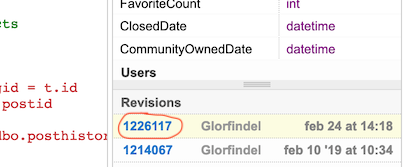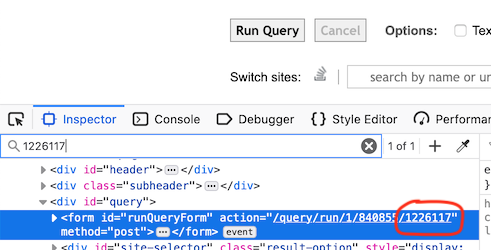This is not an official API, but it is not too hard to simulate the login via OAuth2 and use the session to start executing a query, poll the job that executes it and retrieve the results in the end. I do most of my Stack Exchange development work in Java, but it should be easy to port to other languages even if you don't know Java. I'm using fairly standard libraries: Apache HTTP client, JSON parser org.json and HTML parser Jsoup.
The source code can be found here on GitHub; you'll need to provide your own email address and password which you use for logging in to Stack Exchange at the bottom. To run a query, you'll need the site ID which you can obtain from this list; the query ID (visible in the URL) and the revision ID of the query (visible when you edit the query (left), or otherwise in the HTML of the 'Run Query' form (right)).


Here is the main part of the code, to give you an idea on the complexity.
final CloseableHttpClient client = HttpClients.createDefault();
// Start OAuth2 session
HttpPost postRequest = new HttpPost("https://data.stackexchange.com/user/authenticate");
List<NameValuePair> params = new ArrayList<NameValuePair>();
params.add(new BasicNameValuePair("oauth2url", "https://stackoverflow.com/oauth"));
params.add(new BasicNameValuePair("openid", ""));
postRequest.setEntity(new UrlEncodedFormEntity(params));
String loginURL;
try (CloseableHttpResponse httpResponse = client.execute(postRequest)) {
loginURL = httpResponse.getFirstHeader("Location").getValue();
}
// We need to read and set some cookies in between redirections
RequestConfig noRedirectRequestConfig = RequestConfig.custom().setRedirectsEnabled(false).build();
// Providence cookie
String providenceCookie = null;
HttpGet getRequest = new HttpGet(loginURL);
getRequest.setConfig(noRedirectRequestConfig);
try (CloseableHttpResponse httpResponse = client.execute(getRequest)) {
loginURL = new URL(new URL(loginURL), httpResponse.getFirstHeader("Location").getValue()).toString();
for (Header header : httpResponse.getHeaders("Set-Cookie")) {
String cookie = header.getValue().split(";")[0];
if (cookie.startsWith("prov=")) {
providenceCookie = cookie;
break;
}
}
}
if (providenceCookie == null) {
throw new Exception("No providence cookie found.");
}
// Load login form
getRequest = new HttpGet(loginURL);
getRequest.setHeader("Cookie", providenceCookie);
String fkey, loginActionURL;
try (CloseableHttpResponse httpResponse = client.execute(getRequest);
InputStream inputStream = httpResponse.getEntity().getContent()) {
Document document = Jsoup.parse(inputStream, "UTF-8", loginURL);
loginActionURL = document.getElementById("login-form").absUrl("action");
fkey = document.selectFirst("input[name='fkey']").val();
}
// Submit login form
postRequest = new HttpPost(loginActionURL);
postRequest.setHeader("Cookie", providenceCookie);
params = new ArrayList<NameValuePair>();
params.add(new BasicNameValuePair("fkey", fkey));
params.add(new BasicNameValuePair("email", EMAIL));
params.add(new BasicNameValuePair("password", PASSWORD));
postRequest.setEntity(new UrlEncodedFormEntity(params));
String redirectURL, accountCookie = null;
try (CloseableHttpResponse httpResponse = client.execute(postRequest)) {
redirectURL = httpResponse.getFirstHeader("Location").getValue();
for (Header header : httpResponse.getHeaders("Set-Cookie")) {
String cookie = header.getValue().split(";")[0];
if (cookie.startsWith("acct=")) {
accountCookie = cookie;
break;
}
}
}
if (accountCookie == null) {
throw new Exception("No account cookie found.");
}
// OAuth2 redirection
String location = redirectURL, authenticationCookie = null;
// 1. https://stackoverflow.com/oauth?client_id=...
// 2. https://data.stackexchange.com/user/oauth/stackapps?code=...
// => /
for (int i = 1; i <= 2; i++) {
// the state parameter contains JSON, and Java doesn't like that unless it's %-encoded:
URL url = new URL(URLDecoder.decode(location, "UTF-8"));
URI uri = new URI(url.getProtocol(), url.getUserInfo(), url.getHost(), url.getPort(), url.getPath(), url.getQuery(), url.getRef());
getRequest = new HttpGet(uri);
getRequest.addHeader("Cookie", providenceCookie + (i == 1 ? "; " + accountCookie : ""));
getRequest.setConfig(noRedirectRequestConfig);
try (CloseableHttpResponse httpResponse = client.execute(getRequest)) {
location = httpResponse.getFirstHeader("Location").getValue();
System.out.println(location);
if (i == 2) {
for (Header header : httpResponse.getHeaders("Set-Cookie")) {
String cookie = header.getValue().split(";")[0];
if (cookie.startsWith(".ASPXAUTH=")) {
authenticationCookie = cookie;
break;
}
}
}
}
}
if (authenticationCookie == null) {
throw new Exception("No authentication cookie found.");
}
// Execute query
int siteID = 1; // 1 = Stack Overflow; see https://data.stackexchange.com/sites
int queryID = 748298, revisionID = 1445524;
postRequest = new HttpPost(
"https://data.stackexchange.com/query/run/" + siteID + "/" + queryID + "/" + revisionID);
params = new ArrayList<NameValuePair>();
params.add(new BasicNameValuePair("badgename", "Legendary"));
postRequest.setEntity(new UrlEncodedFormEntity(params));
JSONObject jRoot;
String jobID;
try (CloseableHttpResponse httpResponse = client.execute(postRequest)) {
jRoot = new JSONObject(IOUtils.toString(httpResponse.getEntity().getContent(), "UTF-8"));
jobID = jRoot.has("job_id") ? jRoot.getString("job_id") : null;
if (jobID != null) {
// Results not in cache yet
System.out.println("Starting job: " + jobID);
}
}
while (jRoot.optBoolean("running")) {
Thread.sleep(1000);
// Poll job
getRequest = new HttpGet(
"https://data.stackexchange.com/query/job/" + jobID + "?_=" + new Date().getTime());
try (CloseableHttpResponse httpResponse = client.execute(getRequest)) {
jRoot = new JSONObject(IOUtils.toString(httpResponse.getEntity().getContent(), "UTF-8"));
}
}
// Process results
if (jRoot.has("resultSets")) {
String messages = jRoot.getString("messages");
int totalResults = jRoot.getInt("totalResults"); // NOTE: only populated when the results weren't cached
int executionTime = jRoot.getInt("executionTime");
JSONArray jResultSets = jRoot.getJSONArray("resultSets");
for (int i = 0; i < jResultSets.length(); i++) {
JSONObject jResultSet = jResultSets.getJSONObject(i);
JSONArray jColumns = jResultSet.getJSONArray("columns");
for (int j = 0; j < jColumns.length(); j++) {
JSONObject jColumn = jColumns.getJSONObject(j);
String name = jColumn.getString("name"), type = jColumn.getString("type");
}
JSONArray jRows = jResultSet.getJSONArray("rows");
for (int j = 0; j < jRows.length(); j++) {
JSONArray jRow = jRows.getJSONArray(j);
}
}
} else {
String error = jRoot.has("error") ? jRoot.getString("error") : null;
}
System.out.println(jRoot);



